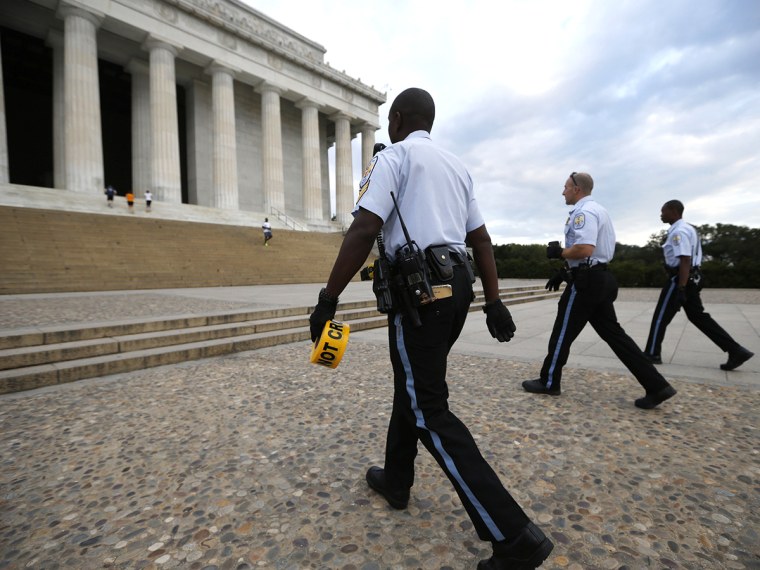The federal government is closed.
After months, weeks and then a frantic day of brinksmanship on Capitol Hill, Congress failed to pass a bill to fund the government Monday night, shutting it down for the first time in 17 years.
At the heart of the debate was Obamacare, a law that survived Republicans taking control of the House, a presidential election and a Supreme Court challenge. Attaching it to a deal to fund the government was the Republican Party’s last chance to block its rollout--which begins Tuesday.
Senate Majority Leader Harry Reid rejected all attempts to touch the law and President Barack Obama threatened a veto.
The law will still roll out on schedule, despite the shutdown, and millions of Americans without health insurance will be able to begin signing up for coverage online.
The question for the rest of the government is: what’s next?
Late Monday night, the Office of Management and Budget ordered heads of executive departments and agencies to "execute plans for an orderly shutdown." President Obama also signed a law passed by both chambers of Congress to ensure that military service members get paid during the shutdown.
But the earliest that a shutdown could be resolved is Tuesday morning. In a last-ditch attempt to save face on Monday night, Boehner tried to force negotiations into a formal committee process. But Reid balked at the idea. “Republicans are still playing games,” he said on the Senate floor shortly before midnight. “This is all a subterfuge to satisfy the Tea Party-driven Republicans.”
“We will not go to conference with a gun to our head,” he said.
Reid said he would be willing to send senators to conference to work on a solution for funding the government through the rest of the fiscal year—but only after the immediate threat of a shutdown was removed and the House passed a short-term funding bill with no strings attached.
Boehner's move was also an abrupt about-face by Republicans who have spent months refusing Democratic offers to hold a conference and work out a budget before October 1.
As midnight approached, they may have begun to fear the political damage that the shutdown could do to the GOP. A poll on Monday showed that 51% said Republicans deserved "a lot" of blame for a shutdown, compared to 41% who blamed Obama himself and 36% who cited Democrats.
The president played that note as well. Moments after midnight, he tweeted:
They actually did it. A group of Republicans in the House just forced a government shutdown over Obamacare instead of passing a real budget.— Barack Obama (@BarackObama) October 1, 2013
Speaker Boehner, not surprisingly, was pushing a different interpretation of the crisis:
Senate Democrats chose to shut down the govt rather than discuss the failures of #ObamaCare http://t.co/et83H7BbO1 #FairnessForAll— Speaker John Boehner (@SpeakerBoehner) October 1, 2013
“The right thing to do was to go to conference any time in that last six months, as we asked 18 times but were told no by the same people who are now sitting on the other side of the aisle saying we want to shut the government down,” Patty Murray said on the floor.
In the House, Boehner wrestled with a conference pressuring him from the right and the left.
House moderates were pressuring their conference to pass the Senate’s “clean” stopgap budget, but Boehner ultimately heeded the calls by the conservative flank to rule out such a measure. By trying to go to conference, Boehner avoided the increasingly difficult process of finding new proposals that could hold together his Tea Party and centrist flanks. Twelve Republicans voted against his most recent measure to delay the individual mandate for a year and cut health subsidies for federal employees, some of them from the right for not attacking Obamacare hard enough and others from the left for extending the shutdown fight.
Other Republicans tried for a last-ditch solution to stop a shutdown, including Sens. Mitch McConnell and Rand Paul who both floated the idea of a one- or two-week delay. Sen. John McCain predicted Republicans would ultimately need to fold--and should just do it. House Republican aides suggested there may be more action in the wee hours of the morning, but with no effective way to avoid a shutdown before the start of business Tuesday, Reid sent the Senate home to return the next morning.
House Republicans themselves seem unsure as to what comes next, still trying to make sense of their own party's latest move. Republican leaders didn't even raised the possibility of going to conference until late Monday night, said Rep. Randy Hultgren of Illinois. "I'm still processing through it," he said. "Very little was discussed."
After midnight, the House passed a resolution largely only party lines, 228-199, requesting to go to conference with the Senate.
Outside the Senate floor, House Appropriations Chair Hal Rogers was explaining the basics of Boehner's conference plan to a colleague, Rep. Bill Young of Florida.
"And that's it?" said Young. "No after-conference plan, huh?"
"Nope," replied Rogers. "Not to my knowledge. But I'm not the boss."
